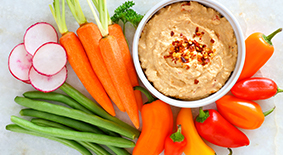Dr. Jain and Linda Talk Plant Power
A Children’s Healthcare of Atlanta physician shares his experience with choosing a plant-based diet and the benefits it brings to your health.
Transitioning to a plant-based diet can be intimidating for even seasoned wellness pros. That’s why Linda Matzigkeit, Chief Administrative Officer at Children’s, reached out to a plant-based expert for advice when she embarked on her own journey to eat a more plant-based diet.
“I was inspired to go plant-based after learning that many elite athletes are powered by plants,” Linda says. “As a bonus, eating a diet comprised mainly of fruits, vegetables and whole grains is more sustainable than eating animal products. I was excited about this lifestyle change, but knowing it would be a challenge, I reached out for expert advice.”
Lucky Jain, MD, MBA, Pediatrician in Chief and Department of Pediatrics Chair, is a lifelong vegetarian and was excited to help Linda begin transitioning to a plant-based diet.
Linda: How long have you been eating a vegetarian diet?
Dr. Jain: I’ve been vegetarian my entire life. My mother was a strict vegetarian and inspired me to eat a plant-based diet. My entire family is vegetarian, so eating a plant-based diet is just second nature.
Linda: What has motivated you to remain a vegetarian all these years?
Dr. Jain: My main motivator for maintaining a vegetarian diet is the health benefits. For instance, eating more whole, plant-based foods can help combat oxidative stress, which research shows contributes to infections, tissue damage and aging. Leafy vegetables and plants rich in color are full of antioxidants, which can help prevent oxidative stress. When you’re putting your health on the line, it’s easier to prioritize what’s good for you.
Linda: Do you have any advice for newbies like me who were raised on meat and potatoes?
Dr. Jain: My advice would be to transition slowly. As in most significant changes, moderation is key. If you try to change everything all at once, you’re more likely to fail. Start with Meatless Mondays or just one plant-based meal each day, and if you want to, slowly remove more and more animal products from your diet by swapping out your protein staples for plants. The easiest substitution you can make is swapping meats for lentils or beans.
Linda: What is your go-to meal when you don’t have a lot of time?
Dr. Jain: Lentils and vegetables are my favorite go-to because they are super easy and very filling. Canned and frozen plant products like beans, lentils and veggies are just as good as fresh ones (just look for low-sodium or no-sodium-added canned products, or rinse with water to remove added sodium). You can also have fun with these staples by adding your favorite seasonings. Just pick a theme and see what you come up with. You’d be surprised how creative you can get with plant power.
Linda: What is your advice for people who want to try a plant-based diet but are worried that it’s not going to fit into their busy lifestyles?
Dr. Jain: Planning and prep is key. I suggest sitting down and writing your meals out for the week—and remember to start with Meatless Mondays. Writing your grocery list out at the same time is also very helpful. Post your weekly menu on the refrigerator at home, and make sure to add in opportunities for take-out or eating out because it’s just not feasible to eat every single meal at home. For snacks, it’s as simple as putting a bowl of fresh fruit on the counter at home and work.

Taking care of your physical wellness
We help physicians build a strong physical foundation by sharing tips and resources on how to eat well and move more.
Learn More

